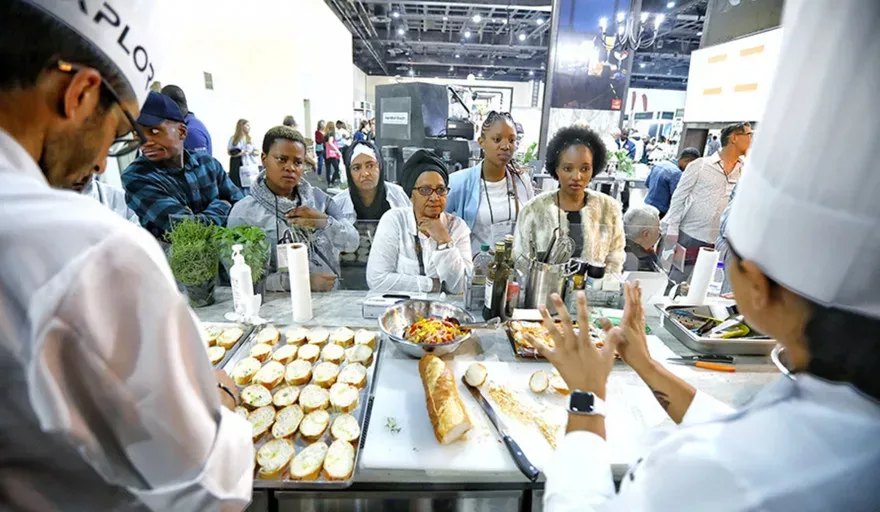Change in transformation and gender equality in tourism will deliver economic growth. We find out more with Lindiwe Sangweni-Siddo, COO of City Lodge Hotel Group, Chair of TTCSA (Tourism Transformation Council of SA), and Show Ambassador for
Hostex 2022.
DRIVING THE HOSPITALITY INDUSTRY’S ECONOMIC RECOVERY
Everyone who’s anyone in the hospitality sector already knew how important the domestic market was to the economy before the COVID-19 pandemic. But this reality was magnified many times for businesses, government, and individuals in South Africa. When the pandemic struck, it was the domestic business and leisure markets – especially the latter which struggled to shake off lockdown cabin fever – that actually saved and revived the tourism sector when it was on its knees.
This suggests that as we look forward to a post-pandemic country, we need to recognise that for the tourism footprint to expand – as it must – new products that are culturally attractive, diverse, and owned and managed by black people, must be incorporated into the market. It clearly follows that domestic tourists will feel a greater affinity to products that are accessible and inviting to them.
TOURISM CHARTER
The Tourism Transformation Charter, developed by the Tourism Transformation Council of SA (TTCSA), which I have the privilege of chairing, acknowledges that our industry is characterised by large disparities in accessing opportunities and benefits, due mainly to the predominance of white ownership along the value chain of the tourism sector.
To share some background for context, in November 2015, the Amended Tourism BBBEE Sector Code developed by the TTCSA in consultation with stakeholders was published in the Government Gazette, in order to advance transformation and provide a basis for monitoring transformation in the sector.
The TTCSA takes the following elements into account when addressing transformation – ownership, management control, skills development, enterprise and supplier development, and social economic development. Here’s a snapshot of some of the results of research on the State of Transformation commissioned by the TTCSA that tell a story:
- Under ownership in the old code, 10 percent of large enterprises achieved the target for women ownership and another five percent were making some progress, while 85 percent of large enterprises had not complied with the women ownership target.
- Under the new code, enterprises are required to comply with 30 percent of exercised voting rights, but it was found that 85 percent of enterprises failed to meet the target, and 48 percent were only striving towards getting those rights.
- Under management control in the old code, all enterprises across all bands were required to achieve 50 percent of black board members, executive directors and senior top management using adjusted recognition of gender. Only 12 percent of large enterprises had achieved the 50 percent target, while four percent had achieved the 25 percent target for black female directorship.
- 40 percent of large enterprises had achieved the target of 63 percent for black middle/junior management and about 20 percent of these had achieved the 32.5 percent target for black female middle/junior management.
- In terms of the new code, the exercisable voting rights of black people has a 50 percent target, but it was found that only 29 percent of large enterprises managed to reach that goal, while 71 percent failed or made no effort.
There’s more that can be included here, but information on the Tourism Charter can be found here.
BRING WOMEN INTO BOARDROOMS
These few statistics show that there’s much work to be done by everyone to speed up the pace of change in both gender equity and transformation in order to grow our domestic tourism market sustainably, while also creating jobs and boosting the overall economy of South Africa.
The absence of black women around boardroom tables and in senior executive management circles is conspicuous, even though women form the core of the tourism sector’s workforce.
This means that when ideas are shared and decisions made, they’re done from a predominantly white male perspective, because that’s who’s dominating the sector’s ownership structures. Women bring a different perspective to an environment, and it could be that the innovation and differences in approaching problem-solving may exclude women to the detriment of the growth of organisations.
The market will also expand when the complexion of the consumers of tourism transforms from the stereotypical white tourist, to a much more diverse traveller.
EXPAND THE MARKET
Women can play a bigger role in ensuring the market is expanded and grown to the extent that an untapped cohort of travellers who would typically not have travelled in the past, would now do so.
We’re also aware of young black millennials (age 26 to 41) who love travelling and trying out new experiences. They use products that give them the new experiences they yearn for, and they’re very conscious of the elements of the transformation, which means that often their buying decisions are made on the basis of whether the business is transformed or not.
We can choose to work together to make South African tourism a bigger, better, and more equitable economic driver to the benefit of us all.
CONNECT WITH HOSTEX
To find out more about Hostex, visit www.hostex.co.za































